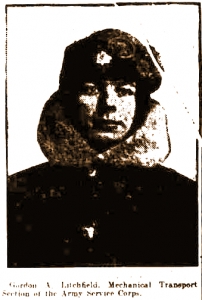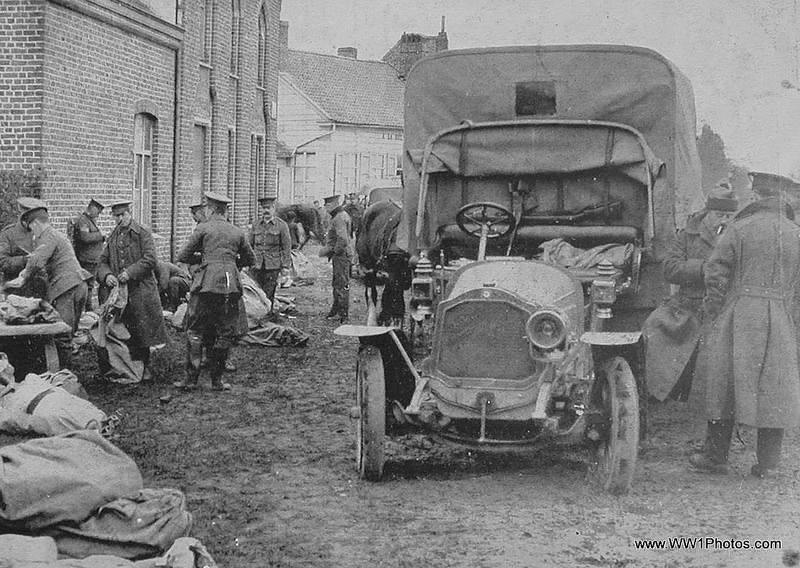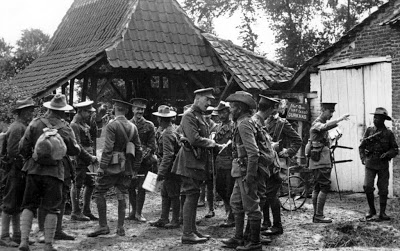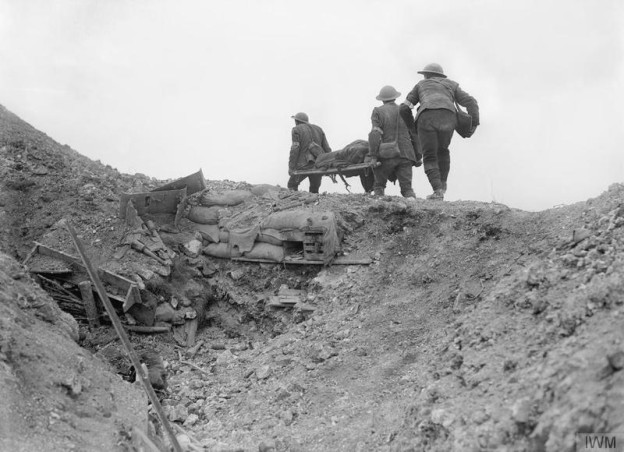A MOTOR DRIVER’S LIFE
Gordon Litchfield is a WWI servicemen whose biography is featured on this website. A newspaper interview and a letter he wrote in 1915 have recently come to light and are reproduced below. By October 1914 he was serving on the western front in the Army Service Corps. While on a short spell of leave in January 1915, he gave an interview to the Nottingham Daily Express (later renamed the Nottingham Journal) and explained what life was like for a soldier whose experiences ranged from taking officers and ammunition up the lines, driving in pitch black darkness, sleeping in pigsties and bringing back the wounded:
From the Nottingham Daily Express, 30th January 1915
Nottingham Transport Driver Tells of Trying Times with No Lights on Dark Roads.
 Mr. Gordon A. Litchfield, whose photograph we give is one of the first batch of Nottingham men who enlisted in the Mechanical Transport Section of the Army Service Corps, He is well known in local scout and musical circles, for prior to joining the Colours he was master of the Sneinton troop of Baden-Powell Boy Scouts for some years while, possessing a fine baritone voice, he has frequently appeared on local concert platforms.
Mr. Gordon A. Litchfield, whose photograph we give is one of the first batch of Nottingham men who enlisted in the Mechanical Transport Section of the Army Service Corps, He is well known in local scout and musical circles, for prior to joining the Colours he was master of the Sneinton troop of Baden-Powell Boy Scouts for some years while, possessing a fine baritone voice, he has frequently appeared on local concert platforms.
The elder son of Mr. A. B. Litchfield, of Dale-street, Sneinton, he enlisted as a Mechanical Transport driver at Grove Park, London, on October 21st, and within a fortnight he was sent to the Continent on active service.
The photograph shows him clad in his fur-lined greatcoat and “ear” cap, just as he returned from duty on the battlefields, from which he brings interesting stories and experiences.
“We left London for Avonmouth on November 2nd,” Mr. Litchfield told a representative of the “Nottingham Daily Express” yesterday, (29th January 1915) and boarding a cattle boat, were sent across to Boulogne. Since then I have done everything from cooking for my comrades to taking out officers and ammunition to the firing line and fetching in wounded. The longest period I was under fire was eight days at Bethune”.
“What is the sensation of being under fire?” “Oh, it sends a funny feeling down your back”. He shivered reminiscently.
“I shall not forget my first experience. It was a pitch dark night – all movements are carried out under cover of darkness. I had taken up an officer at about 10.30 or eleven o’clock, and after the officer had left me to go into the lines, I heard the bullets hitting the trees close by. Then I saw and heard the shells bursting, perhaps a quarter of a mile away. I had not been there long before I thought it time to look for shelter, and, luckily, close to, there was a farmhouse. The place had been knocked to bits by shells, and I was able to back the car though a big hole in the wall into one of the rooms of the house.
I had just got fixed up for the night, when I heard something shuffling about inside, I slipped five cartridges into my rifle – I should tell you that all drivers are armed with a kind of light rifle or carbine – and waited. Then the form of a man appeared, and I challenged him, but he turned out to be an English interpreter, and I was pleased to have his company. It was a miserable place. While we were talking I heard another shuffle, and two forms came creeping along the crowd. I again took up my rifle, but a voice called out: “It’s all right, mate.” They were a couple of English ‘Tommies.’ One had been wounded on the ankle by shrapnel, and the other had crawled with him on his back from the trenches. I put the wounded man into the car, and gave him a loaf and a little tin of jam. He finished them before the night was out.
Transport on the Western Front, courtesy of ww1photos.com
That night we got wet to the skin. It rained in torrents. I have been drenched time after time since then, but I have not had even a slight cold. Motor driving out there is very exciting work. There are no lights on the roads and no lights on the cars. The roads are only metalled in the centre, and one either side there is a foot of thick mud, I saw scores; omnibuses, and transport wagons which had overturned on the sides of the roads. They are to be left there until they can be got up. Sometimes I have had to ride on the front mudguard, and give directions while an officer has driven the car. But it’s good sport, and every man who can drive a car should go. I slept in a pig-sty one night at Bethune. That was a ‘great night.’ Rain was falling heavily, and I had to get shelter of some kind. I climbed into a pig-sty at one of the farms, and then up on to some straw above the pigs. What with the grunting of the pigs and the rain falling like the very dickens, well – I tell you it was a great night.
The countryside in the entrenched districts is absolutely desolate. The houses are smashed to bits in some places, and you see big farm buildings with great holes in them. Just now I suppose it looks very bad, because the trees have no leaves and the roads and fields have been cut up the traffic”.
A Gurkha fright
1st Gurkha Rifles, France 1915, courtesy of theveergorkha.blogspot
“The most startling experience I had was with a Gurkha. I had taken up an officer to the entrenchments, and he as just about to leave me, when we heard something coming. The officer turned round sharply and called to me: ‘Look there!’ It was a Gurkha stealing along the hedge-side towards us on his hands and knees. He had his knife in his mouth, and he was not the sort of being you would care to meet on a dark night. He smiled when he saw we were English, but he startled me, and the stories our fellows tell about the Gurkhas out there make your shudder”.
Mr. Litchfield has seen Commander Sampson at work on his armoured car, while other experiences which have befallen him are the collection of the wounded from the base hospitals. A motor transport man has to drive all kinds of cars, but the task is far from unpleasant.
“Our ‘Tommies, he said, enjoy themselves in the trenches. They have gramophones and are well clothed; and they have plenty to eat. I should imagine they practically keep the poor people in the entrenched districts. Everybody out there seem to have lost every penny they had; and our soldiers give them all the food they can spare. The food we get is really splendid, and there is no complaint to be heard anywhere in regard to that. In the districts which the soldiers call ‘up country,’ the people will do anything for you. One of our fellows, I must tell you, could not get shelter one night, so he broke open a cafe and made himself very comfortable. The soldiers in the trenches seem to me to be happier than those at the bases. I have not heard a bit of music at the bases, and there is only one piano that I know of in Boulogne. It is in the Y.M.C.A. tent. I want to get together a few mouth organs and concertinas for the soldiers at the bases, and if anybody will send me some I would be glad.”
Mr. Litchfield is at home on seven days’ leave, and returns to Boulogne on Thursday, 4th February 1915.
Six months later a letter appeared from Gordon Litchfield in the Nottingham Journal. He would have been writing within the constraints of censorship; his letter is a patriotic appeal for men to enlist. His work in the Army Service Corps continued to be varied. He was not directly exposed to enemy fire but stretcher bearing duties brought him into close contact with the mortally wounded. As in his interview while on leave, he comments on the impact of the war on the French population working on the edges of battlefields while their land was torn up around them..
From the Nottingham Daily Express (Nottingham Journal) 23rd July 1915
Nottingham Soldier’s Appeal from the Front for Recruits
An interesting appeal to Nottingham men to join the Colours “right away” comes from the Front in a letter written by Lance Corporal G.A. Litchfield, elder son of Mr. A.B. Litchfield of Sneinton-dale. Lance Corporal Litchfield joined the Mechanical Service section of the Army Service Corps, shortly after the outbreak of war, and for nine months he has been driving cars and transports on the battlefields of France. In his letter, which is written to a friend, he says:
“Well, things are still the same here, or I should say here, there and everywhere. I say that because I do not stay in one place very long. There is so much to do, in fact there is work out here for every man, and every man should join and take his share. My experiences are very varied. I have been everything from a cook to an undertaker. A week ago I was up ‘the line’ and had tea in the garden of a farmhouse.
Whilst we were sitting at tea we could clearly see the shells bursting and the girls who were serving us told us that the house was quite within range of the guns; it was right too! It is quite remarkable to see the people going about their business as though nothing was happening. All the time there is the boom boom boom, but the women are walking about with their yoke and two pails, fetching water, or sweeping the roads; the French soldiers and civilians stand in groups talking, and the children are playing in the streets with an occasional ‘cigarette pour moi, sare’ if one stops with the car.”
“A few days ago I was bringing down a load of stretcher cases, and as you no doubt know the roads are none too good. One poor fellow cried out ‘For God’s sake driver, stop!’ He was in terrible pain and unfortunately died before reaching the hospital.
Stretcher bearers in WWI, courtesy of the Imperial War Museum
Q1332 Photographer Lt. Ernest Brooks
French v. Nottingham girls
I very often wonder how Nottingham looks. How lovely it must be to go to a music-hall or theatre. I would willingly stand the worst bill on record. Before coming out here I used to hear a lot about the charms of the French girls, but you can believe me they do not come up to the girls of good old Nottingham. The French and Belgians will do anything for an ‘Anglais soldat’, and this is very marked as one gets further up the country. Yes, we want every man out here; there is work and a place for everyone.”
This was the last letter from Gordon Litchfield that was published in the Nottingham papers. He may have found it increasingly difficult to maintain his optimism in the light of the overwhelming number of casualties as the war continued. Gordon survived the war, married Marie Nachez in 1918 and lived in Radcliffe on Trent until his death in 1973. He founded Nottingham Radio Supplies in 1921 and was managing director until his retirement.



